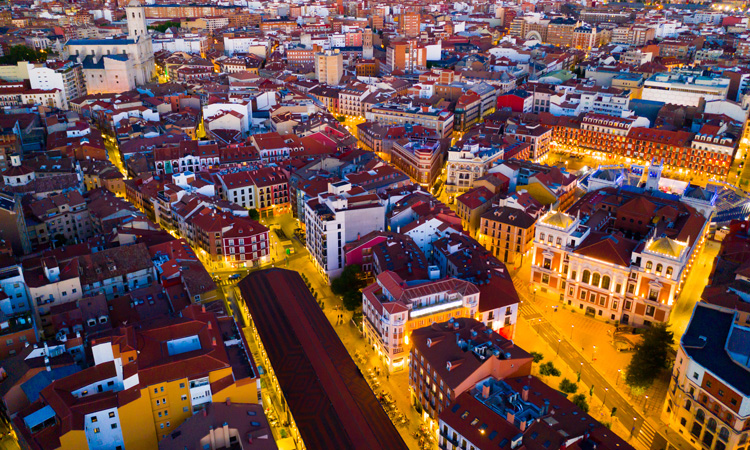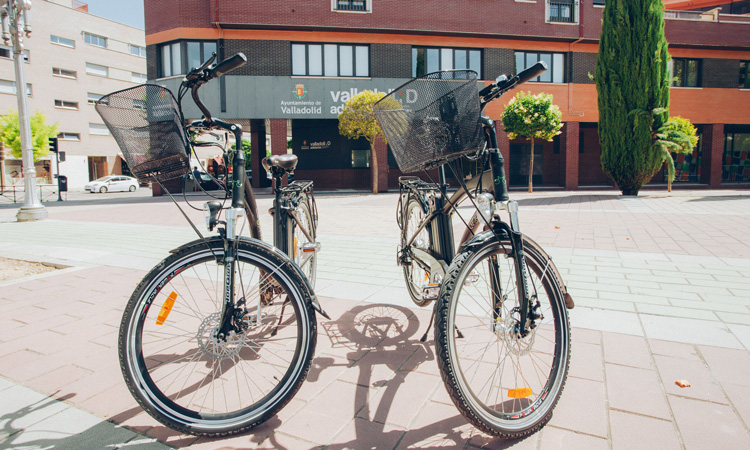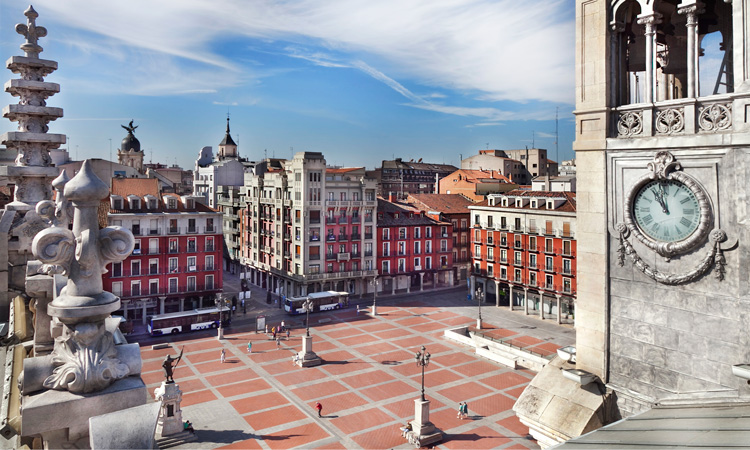City Snapshot: Valladolid’s sustainable approach to the future of mobility
- Like
- Digg
- Del
- Tumblr
- VKontakte
- Buffer
- Love This
- Odnoklassniki
- Meneame
- Blogger
- Amazon
- Yahoo Mail
- Gmail
- AOL
- Newsvine
- HackerNews
- Evernote
- MySpace
- Mail.ru
- Viadeo
- Line
- Comments
- Yummly
- SMS
- Viber
- Telegram
- Subscribe
- Skype
- Facebook Messenger
- Kakao
- LiveJournal
- Yammer
- Edgar
- Fintel
- Mix
- Instapaper
- Copy Link
Posted: 9 March 2020 | Ángela Rivada - Valladolid City Council | No comments yet
The city of Valladolid gathers academia, research and technological centres, together with large companies and small and medium-sized enterprises, working as a whole to deliver one of Europe’s most innovative cities. Angela Rivada, Smart City Project Coordinator at Valladolid City Council, tells us more about some of the initiatives and developments currently taking place in the city which have helped it gain this recognition.


Valladolid, in the heart of Spain, is an innovative city with a high level of smart city development in which sustainable urban development, smart heritage, smart mobility, social innovation and smart governance configure a holistic approach of what a smart city means.
In terms of mobility, Valladolid has several factors which see it rank highly for quality of life among its almost 300,000 inhabitants, thanks to its size, orography, safety and health, among other things. A good example of this is the fact that 53 per cent of its inhabitants choose walking as their primary mode of transport.
Valladolid has designed a sustainable urban mobility plan, “PIMUSSVA”, in which citizens are at the centre of the decision making process
Sustainable mobility has become a concern shared by most cities, especially in Europe, which are committed to the quality of public transport, the promotion of non-motorised modes (walking and cycling), sensitivity to the environment and a more rational use of the public space. Public authorities have committed to design policies that directly affect the quality of life of their citizens and promote the image of a smart, sustainable and integrated city.
Beyond the adoption of certain measures, it is above all a matter of consolidating certain guidelines and sensitivities in local mobility management, seeking consensus and participation, maintaining long-term guidelines and improving information and decision-making systems. To that end, Valladolid has designed a sustainable urban mobility plan, “PIMUSSVA”, in which citizens are at the centre of the decision making process.
The Agency for Innovation and Economic Development
The Agency for Innovation and Economic Development of the City Council benchmarks existing economic and innovation opportunities in the city, encourages enterprise momentum, boosts job creation and employability, and leads the development of projects of innovative character, both nationally and internationally.
Working closely with the knowledge and expertise of the different departments of the municipality, the Agency for Innovation has carried out several European innovative projects in the field of energy efficiency, sustainable mobility and nature-based solutions for renaturing Valladolid.
Sustainable mobility from different perspectives
The sustainable urban mobility plan of Valladolid implies an integrated and holistic approach in which sustainable infrastructure, governance, sustainable urbanism and technology work as pieces of a well-oiled engine.
Proof of this are initiatives and projects carried out within the umbrella of PIMUSSVA as “S2CITY.” This initiative aims to improve citizen and tourist services through ICT. To achieve this goal, the initiative proposes the creation of unique access to public services via a traveller’s card and/or mobile device, while rewarding those citizens who contribute to build a more sustainable and smart city by applying gamification techniques.
To encourage people to engage and take action to build a more sustainable Valladolid, the City Council has designed a role playing game – “Build your sustainable city” – in which citizens obtain points in the mobile game from their real actions in the city related to sustainability: actions such as catching the bus, using public bicycles, charging electric vehicles, and taking the stairs instead of the elevator in public buildings. The commercial sector will be engaged in the initiative, with points obtained in the game generating discount vouchers in adhered stores and tickets for access to museums and other cultural venues.


In terms of infrastructure, it is worth highlighting the efforts to renew the bus fleet with more eco-friendly vehicles. Line 7 that crosses Valladolid from south to north has been electrified with electric buses charging via pantographs located at the first and last stops. The next step in the renewal process is to change the oldest buses to others more sustainably powered by compressed natural gas (CNG) with a new purchasing procedure of 20 buses and 30 trucks for the cleaning service.
In terms of infrastructure, it is worth highlighting the efforts to renew the bus fleet with more eco-friendly vehicles
The electrification of Line 7 was supported by the European Project REMOURBAN among other mobility actions in the city such as the deployment of public charging infrastructure for electric vehicles and the promotion of purchasing electric vehicles. All actions within the REMOURBAN framework are being monitored in order to obtain useful data about consumption, battery level, regenerated energy under braking, and other parameters whose availability help city-planners to make more strategic decisions.
Valladolid is also working in a more sustainable urbanism, making the infrastructure more eco-friendly so that citizens are more likely to walk or cycle. Urban GreenUP is an European project for renaturing cities with the aim of mitigating the effects of climate change, improving air quality and water management through innovative nature-based solutions: green routes for bicycles and pedestrians to encourage sustainable mobility and reduce carbon emission, shady pedestrian zones with street green canopies, and green noise barriers, among 40 other nature-based solutions that are being deployed in the city.
Alert plan against contamination issues
Although traffic jams are not a big concern in Valladolid, air quality certainly is an issue with the city suffering high levels of ozone and other contaminants in concrete periods. The City Council has defined an action plan against contamination situations, which deploys a set of measures in case of an increase in the levels of some contaminants in the atmosphere. One of the more restrictive measures is to not allow private cars into the city centre (Low Emissions Zone) together with measures of citizen engagement to encourage the use of public transport or another sustainable means.
The ‘Action Plan against Contamination Issues’ was approved on 1 February 2017 by the Governing Board of the municipality of Valladolid. It contains three phases of action:
- Prevention phase: This comprises actions focused on information to citizens, especially to the more susceptible inhabitants: elderly people, infants, pregnant women, people with respiratory diseases, etc. It also takes actions for promoting public transport
- Warning phase: This includes information to citizens and the promotion of public transport but incorporates traffic restrictions in the Low Emissions Zone as well as lowering speed limits
- Alert phase: This increases traffic restrictions: diesel vehicles are not allowed to use the Low Emissions Zone, some two-lane roads converted to one-lane roads, and lowering speed limits in some areas.


Open to citizens: designers of the future of the city’s mobility
PE4Trans project – Public Engagement for Sustainable Transport – is another initiative for sustainable mobility, in this case centred on governance and participatory process. It addresses the potential for improving public transport policies by including citizens in the design and implementation process of sustainable transport strategies and plans, with the view to changing mobility habits and routines. This means influencing behavioural change using knowledge and good practices of environmental solutions based on economy, sociology and psychology developments to encourage people towards more sustainable routines and habits.
Valladolid is also working in a more sustainable urbanism, making the infrastructure more eco-friendly so that citizens are more likely to walk or cycle
Thanks to the different tasks and participatory process the City Council gains understanding and of the decision making process through the ‘Citizens Panel’, working to enhance PIMUSSVA with the contributions of citizens and other stakeholders.
Night economy as a low carbon economy
People who travel at night, whether for work or leisure, move with specific patterns – quite different of those seen by morning travellers. The City Council has launched an analysis of night mobility patterns for defining new policies focused on encouraging night economy, while not compromising CO2 emissions and noise levels. It has been working on the opportunities for night deliveries using electric vehicles; how empty spaces – at night – could be used for facilitating deliveries or even micro-mobility as a new means of transport for people moving at night.
Biography
Ángela Rivada is the Project Manager at the Agency for Innovation and Economic Development (Valladolid City Council). She is a Telecommunications Engineer and Economist with more than 15 years of experience in Project Management, focused on innovation and technology.
She is responsible for coordinating Smart City Projects at Valladolid City Council. Angela has participated in the design, analysis and coordination of multiple initiatives and projects focused on innovation applied to cities, mainly in the field of sustainable mobility, energy efficiency and ICT.
Related topics
Fleet Management & Maintenance, Infrastructure & Urban Planning, Mobility Services, Sustainable Urban Transport
Related cities
Valladolid
Related organisations
Valladolid City Council







